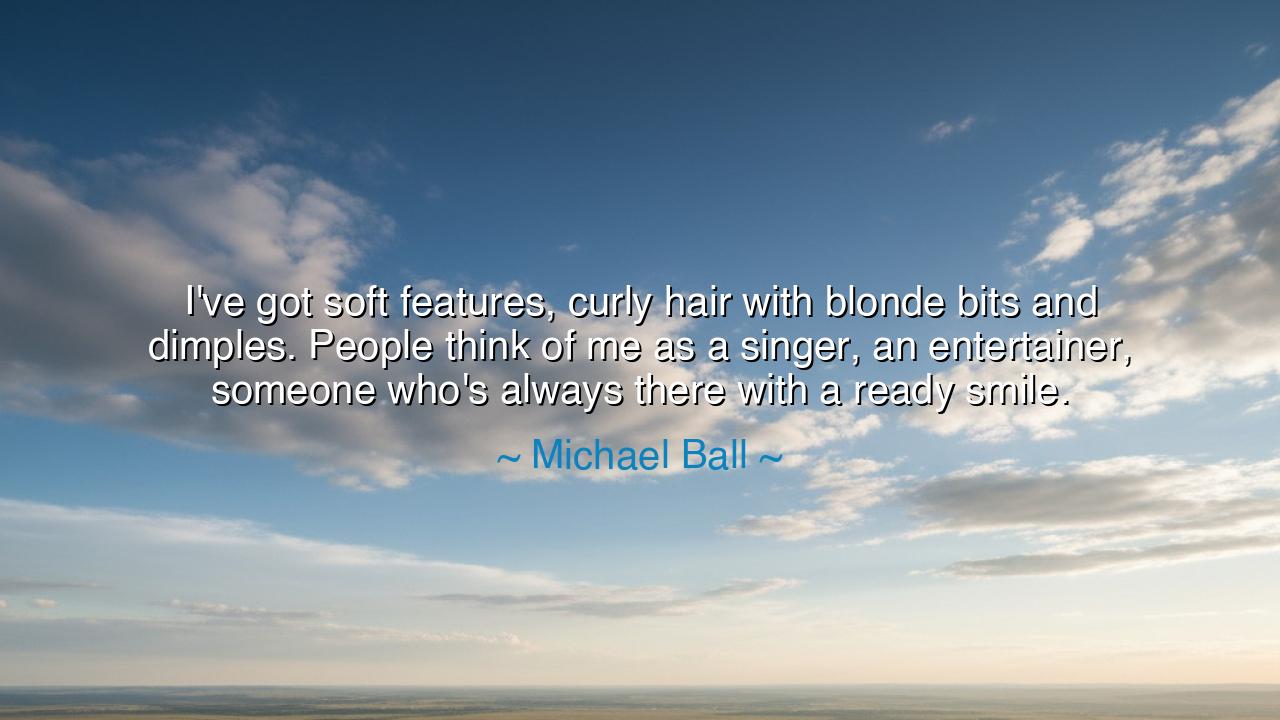
I've got soft features, curly hair with blonde bits and dimples.
I've got soft features, curly hair with blonde bits and dimples. People think of me as a singer, an entertainer, someone who's always there with a ready smile.






The words of Michael Ball are spoken with a gentle candor: “I’ve got soft features, curly hair with blonde bits and dimples. People think of me as a singer, an entertainer, someone who’s always there with a ready smile.” Though modest in tone, they reveal a profound reflection on the way outward appearance and public image intertwine, shaping how a person is seen and remembered. Ball does not deny the lightness of his presence, nor the joy his art inspires; instead, he embraces it, showing that identity is not always forged in sternness or severity, but sometimes in warmth, accessibility, and the radiant offering of a smile.
To speak of soft features and dimples is to acknowledge that the world often measures character by appearance. The warrior’s scarred face inspires fear, the philosopher’s lined brow commands respect, and the entertainer’s open smile invites trust and ease. Michael Ball recognizes that his own countenance, combined with his voice, has placed him not among conquerors or rulers, but among those whose calling is to lighten the burdens of others through joy and melody. This is no lesser path, for the ancient world itself honored the poet and the bard as much as the general, knowing that songs often outlive empires.
The calling of the singer has always been sacred. In Greece, the lyre-players sang of heroes; in Ireland, the bards carried the memory of their people; in every culture, the entertainer stood as the keeper of joy and sorrow alike. When Ball says he is thought of as an entertainer, it is not merely to say he amuses—it is to confess a vocation that is older than kings, the vocation of lifting the hearts of others. His smile, whether in song or in presence, becomes a gift, a sign that art is not only performance, but communion between souls.
History offers us countless mirrors of this truth. Think of the Italian tenor Enrico Caruso, whose voice carried across continents, but whose smile and warmth made him beloved even among those who could not understand the words he sang. Caruso, like Ball, was not only a man of music but a man of presence—his features and demeanor shaping how audiences received his art. His ability to be seen not as distant or severe, but as accessible and full of humanity, gave his music a power that mere technique could never supply.
Yet Michael Ball’s reflection also reveals a subtle caution. When one is always seen as the one “with a ready smile,” the world may forget that behind the entertainer stands a human being with struggles, doubts, and storms of his own. This is the burden of the joyful: to carry light for others even when they themselves may walk in shadow. It is the paradox of the performer, honored in every age—that the mask of cheer conceals a soul that is as vulnerable as any.
The lesson for us, therefore, is twofold. First, we must honor those who bring us joy, not dismissing their art as shallow or easy. To offer laughter, music, and a smile in a weary world is to heal wounds we cannot always see. Second, we must remember that entertainers, singers, and those who lift us up are also human, deserving of compassion and understanding beyond the stage. They may be the source of our comfort, yet they, too, need comfort in return.
Thus, let each of us learn to value the power of softness—the gentle face, the warm presence, the ready smile. For though the world may praise strength and conquest, it is often gentleness that heals. And if you, like Michael Ball, are seen as one who carries light, embrace it—but do not fear to show your depth as well. For true artistry lies not only in the song, but in the humanity behind it.
In this way, Ball’s words become a teaching: that identity is shaped not only by what we do, but by how we are received; that the gift of joy is itself heroic; and that to smile in service of others is to write one’s legacy not in stone, but in the hearts of all who have been lifted by your presence.






AAdministratorAdministrator
Welcome, honored guests. Please leave a comment, we will respond soon